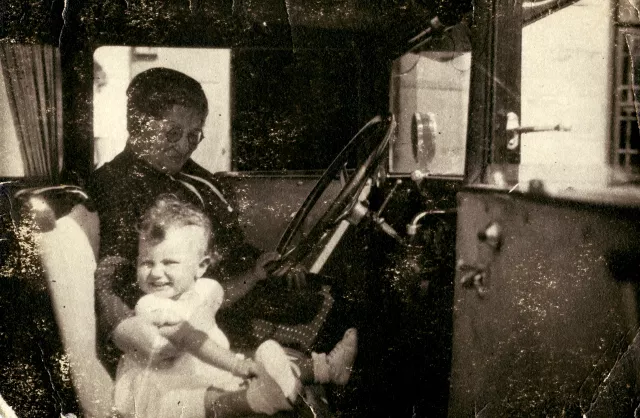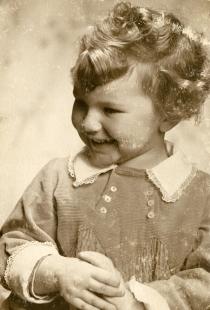This is my mother-in-law Anna Leibel with my daughter Halinka. The car, a Tatra, was ours.
My husband had a Tatra, a Czech car, he'd had it since 1926 or 1928, I think. He only bought a Mercedes right before the war, in 1939. First he taught me to drive himself, and then later, when there was this automobile course in Kalwaria, he invited 2 examiners round, and told them I wanted to take the exam, that I hadn't been on a course, but he'd taught me everything himself. There were 2 examiners, my husband sat in on it as well, and I drove the car. There wasn't any traffic as such in Kalwaria, but this beggar, this invalid, an old man, happened to be crossing the road, and I swore, something vulgar, like: 'Darn, goddammit! He had to go and get in my way!' And the examiner found that very funny: 'Well, now you're a real driver!' No, my husband wasn't afraid to give me the car… My husband would have given me anything. He was a wonderful man, a very good son, husband and father. His mother worshipped him. And my parents, no question - obviously.
After he proposed to me, Julek was back and forth from Kalwaria Zebrzydowska [approx. 25 km from Cracow], where he lived with his parents, to me in Cracow all the time. It was winter. Along the Kalwaria-Cracow road there were woods nearly all the way, and attacks on travelers happened all the time. My mother-in-law was afraid that something would happen to him and refused to let him go to Cracow. She demanded a quick wedding: 'It's not like you met each other yesterday, you can get married, let her come to you here and that's the end of it.' My mother-in-law was called Anna, and my father-in-law Markus. The wedding was 3 months after the marriage proposal. We moved to Kalwaria, and our daughter, Halinka, was born on 14 June 1934.
Julek's grandparents and my in-laws lived in a house across the square from us, at right angles. I got on very well with my mother-in-law, and my father-in-law was very fond of me. He was no longer working, but they were all still taken up with the leather business. Wouldn't I have preferred to stay in Cracow? If Julek had business there, I went there to be with him. I'd have gone to hell to be with him, not just to Kalwaria. I was madly in love. What my husband's firm was called? It wasn't called anything - there was just a wagon full of goods, off it went, and that was it. Abroad. I don't know exactly where those wagons went.
When I got married, our maid from Czarnieckiego Street went with me to Kalwaria, but she lasted it a few months and then left. Said she was bored. There were 3 or so people from the village working for my husband, so the daughter of one of them came - and shortly afterwards got married. And after that I had local maids - they were very easy to hire. The working conditions were good at our house: there were 2 rooms, one child, good pay, board, the washerwoman came to take the linen - the maid wasn't overworked. She used to go with me and Halinka for walks - a little further up the hill there was a place where you could go for walks, because further on, to the [Bernadine] monastery, you couldn't go, because Jews were not allowed in.



















